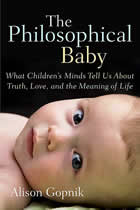
Title: The Philosophical Baby
Author: Alison Gopnik
Source: Veddma library
ISBN: 9780312429843
Available online
Notes: The book discusses the current research into the minds of children and compares the results with what we know about consciousness and perceptions of adults. The author describes the benefits of imaginary companions and imaginary worlds and their role in developing the human ability to think causally. She discusses “the work of play” referring to the children’s activities that adults perceive as fun whereas they are an important function from an evolutionary perspective.
The author discussed many experiments, including the one that shows that young children learn of other people’s preferences even when they differ from their own, and are eager to satisfy those preferences if given the means. Research also shows that even though children remember things that happen during their day, they might respond with “nothing” when asked to describe it. However, when asked about particular events, children may become very animated while talking about them, showing that they do indeed remember them in detail, but need a cue to retrieve the memory.
Children as young as eight months old are sensitive to statistical probabilities, expecting things to behave as they have behaved previously. Children also assign human characteristics to things that seem interactive: they assume that a blob that beeps in reaction to their actions has desires and intentions, and try to help it fulfill those intentions if possible.
Up until about four years old, children do not have an “inner autobiographer”, an ability to link their past, current, and future selves into a continuum of events experienced by the same person. Instead they only have an episodic memory. They live in the current moment and do not have much of an inner monologue about past events and future possibilities.
The author states that the research suggests that our childhood experiences shape our adult lives. However, this does not necessarily happen in a Freudian sense where having abusive parents causes one to become an abusive parent. Whereas that is a possibility for some, others analyze their childhood experience and strive not to be like their parents, thus breaking the abusive parenting cycle. Babies also shape their parents’ lives: a sad mother makes for a sad baby which in turn makes the mother even more sad.
When adults focus their attention during meditation or place themselves in a situation where everything is unfamiliar and thus needs constant attention (such as during travel to places with cultures significantly different from their own), they occupy a certain state of consciousness that is very similar to the state a baby experiences every day. Things that are new grab a baby’s attention just like they do an adult’s attention, and since there are many more unfamiliar things in a baby’s environment, babies occupy this state for a much larger percentage of their wakeful hours.
The babies have different styles of attachment: secure babies know that their needs will be met and feel fine with a caregiver leaving occasionally, as they know that the caregiver always comes back; avoidant babies tamp their emotions down and do not cry during separation as they know that the crying will most likely lead to a caregiver being angry thus leading to more grief for the baby; anxious babies cling to their caregiver upon their return and might get angry at the caregiver and throw their toys at them at the same time to express their unhappiness; whereas disorganized babies never develop any consistent expectations at all. Babies as young as twelve months can make predictions about love (whether a parent in the film will react with love or annoyance to a crying baby).
Children also make a distinction between breaking arbitrary rules and inflicting serious harm. Children know the difference between intentional and unintentional actions, and they are both empathic and altruistic by the time they reach eighteen months of age.
The book also notes the absence of motherhood and childrearing themes in most philosophical writings.
The author tries to make the book appeal to a common reader, keeping scientific terminology to a minimum and referring to several examples multiple times to illustrate the concepts. There are a few references to popular culture, including a reference to the Matrix (Neo’s “wow” reaction) and to the Dax symbiont from Deep Space 9 (whom the author mistakenly calls Jadwiga instead of Jadzia). Sometimes these attempts to bring the concepts to the reader seem simplified a bit too much, abstracting away quite a few details of research. Perhaps the book would have benefitted from more information and less interpretation.
Overall, quite an interesting read with good examples, interesting experiments, and clear delivery.





